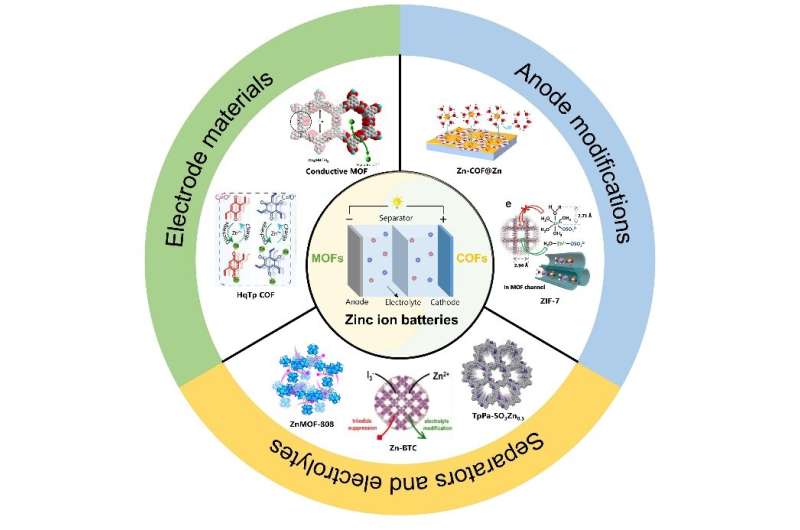Metal/covalent organic frameworks for aqueous rechargeable zinc-ion batteries

In a review led by Prof. Chunyi Zhi (City University of Hong Kong) and published in the journal Science China Chemistry, researchers focused on the current advances in the development of MOF/COF-based materials for ARZIBs, including the material design of MOFs/COFs, the storage mechanism of Zn2+ in MOFs/COFs, the use of MOFs/COFs to control the deposition behavior of Zn2+, and the use of MOFs/COFs as separators and solid electrolytes.
Although excellent progress has been made, a few challenges remain in the application of MOF/COF-based materials in ARZIBs. First, straightforward methods for the preparation of large-scale MOF/COF-based materials must be developed to offer more choices. For instance, one-step self-assembly or direct electrodeposition can be used to coat MOFs or COFs on zinc foil.
Second, investigating the ion storage mechanisms of MOFs and COFs, which is difficult at the atomic level, requires advanced characterization tools and theoretical calculations. Third, the mechanical and chemical stability of MOFs and COFs must be further improved to realize highly durable devices. During the cycling process, the volume distortion resulting from the dissolution of intermediates and ion intercalation during the charge–discharge process negatively affect the stability of MOFs and COFs.
Reasonable pore and structure design is necessary to ensure efficient ion transport and accommodate ion intercalation. Fourth, in contrast to the traditional crystalline state, the glass state of MOFs has received considerable attention because of its improved mass transport, mechanical properties, and ability to form grain-boundary-free monoliths.
However, applications of glass-state MOFs in ARZIBs are still lacking. Fifth, additional effort must be devoted to device-level optimization in more practical scenarios, including those involving large cells, high loading masses, and lean electrolytes.
In conclusion, MOFs and COFs are a promising class of advanced materials for the development of high-performance ARZIBs. The review systematically describes the most recent developments and applications of MOF/COF-based materials in ARZIBs. They hope that this review can provide guidance and inspiration for the design and development of MOFs and COFs with novel compositions, structures, and functionalities for high-performance ARZIBs.
More information:
Hu Hong et al, Metal/covalent organic frameworks for aqueous rechargeable zinc-ion batteries, Science China Chemistry (2023). DOI: 10.1007/s11426-023-1558-2
Citation:
Metal/covalent organic frameworks for aqueous rechargeable zinc-ion batteries (2023, July 6)
retrieved 6 July 2023
from https://phys.org/news/2023-07-metalcovalent-frameworks-aqueous-rechargeable-zinc-ion.html
This document is subject to copyright. Apart from any fair dealing for the purpose of private study or research, no
part may be reproduced without the written permission. The content is provided for information purposes only.
For all the latest Science News Click Here
For the latest news and updates, follow us on Google News.

